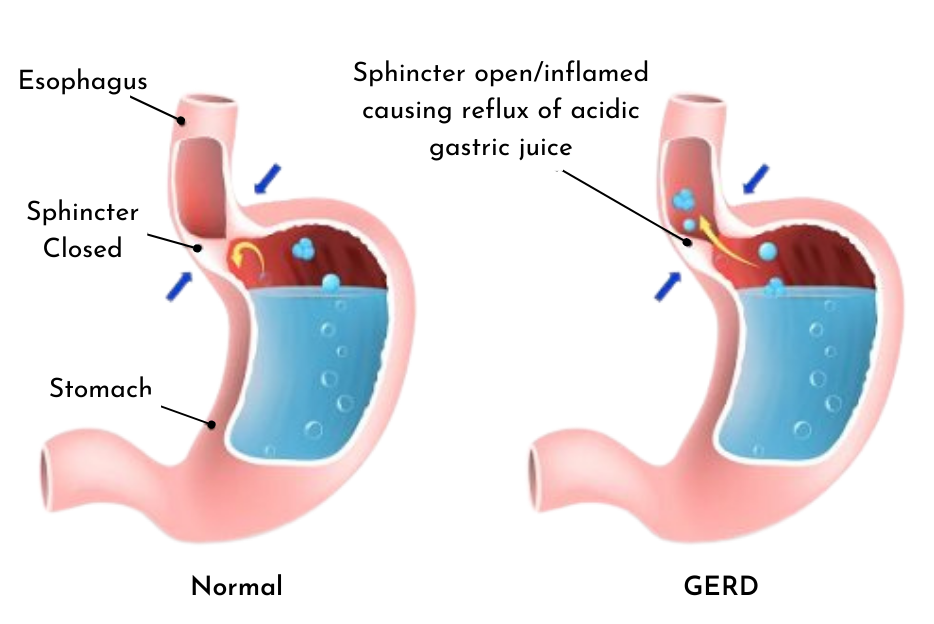Our body is a complex and sophisticated biological system that functions harmoniously to sustain life! For instance, did you know that our body changes from acidic to alkaline across the length of the gastrointestinal (GI) tract to facilitate optimal digestion and nutrient absorption? To support this process, the pH levels within different parts of the GI tract vary. When this acid-base balance goes off-balance – especially in the stomach, it demonstrates as acidity in our body with its associated discomforts. The good news is it is possible to manage acidity and its discomforts with the right dietary and other lifestyle choices.
The Delicate Acid-Base Balance
Starting from the mouth, the pH is generally close to neutral, around 6.5 to 7.5, allowing for the initial stages of digestion through chewing and saliva production. As food travels down the esophagus (food pipe) to the stomach, it encounters a highly acidic environment due to the secretion of gastric acid. The stomach pH is typically between 1.5 and 3.5, which aids in the breakdown of food, sterilizes it by killing potential pathogens, and activates enzymes involved in protein digestion. The ph level changes back to alkaline in the small intestine, and back to acidic again in the large intestine. Our body, quite remarkably, manages and controls this acidic-alkaline balance to activate various digestive enzymes, across the length of the GI tract to create an optimum environment for the digestion, absorption and assimilation of nutrients from the food.
Also Read: Improving the Gut microbiome – Priobiotics & Prebiotics
However, quite often, due to our lifestyle choices and dietary habits, this delicate balance of acidity within the GI tract can be disrupted, leading to an increased prevalence of acidity-related issues. The sphincter muscles at the bottom of the food pipe that facilitate only one-way passage of food (from the mouth to the stomach), become inflamed and faulty, allowing the reflux of the built-up gastric acid in the opposite direction – back to the mouth, through the food pipe. This causes heartburn and discomfort

Causes of Acidity
Excessive production of stomach acid: One of the primary causes of acidity is the overproduction of stomach acid. This can occur due to factors such as certain medications, stress, or underlying medical conditions. When the stomach produces an excess amount of acid, it can lead to symptoms like heartburn, acid reflux, and indigestion.
Consumption of acidic foods and beverages: The foods and beverages we consume play a significant role in our body’s pH balance. Some foods and drinks have naturally high acidity levels, which can contribute to increased acidity in the stomach. Citrus fruits, tomatoes, vinegar, spicy foods, carbonated drinks, and caffeinated beverages are examples of items that can trigger acid production and worsen acidity symptoms; reducing their intake is important to manage acidity
Lifestyle factors: Certain lifestyle factors can exacerbate acidity. Sporadic eating habits, chronic stress, lack of sleep, and irregular eating habits can disrupt the natural balance of acid production in the stomach. Stress, in particular, can stimulate the release of stress hormones that affect digestion and increase acid production. Factors such as a high intake of acidic foods, excessive consumption of caffeine and alcohol, smoking, and poor dietary habits also can contribute to an imbalance in the body’s acid-base equilibrium. These factors can either lead to an overproduction of stomach acid or weaken the protective mechanisms in the digestive system, resulting in conditions like acid reflux, heartburn, and gastritis.
Medical conditions: Several medical conditions can contribute to acidity. Gastroesophageal reflux disease (GERD), peptic ulcers, gastritis, and hiatal hernia can cause or worsen acidity symptoms. Additionally, certain medical conditions such as H-pylori infection can disrupt the natural balance of acidity in the GI tract, exacerbating symptoms and increasing the risk of complications. Certain autoimmune diseases like Ulcerative Colitis, Chron’s disease also can cause severe gastrointestinal discomfort and acidity. These conditions often require medical interventions along with lifestyle modifications to manage acidity and alleviate symptoms effectively.
Also Read: Managing H-Pylori & Acidity
Diet to manage Acidity
It is crucial to be mindful of our lifestyle choices and make conscious efforts to promote a healthy acid-base balance within the body and thus manage acidity. This includes adopting a well-balanced diet that includes plenty of fruits, vegetables, whole grains, and lean proteins while limiting acidic and spicy foods. Practising portion control, eating smaller meals at regular intervals, and avoiding lying down immediately after meals can also help prevent acidity-related issues.
Avoiding sporadic meals and maintaining a reasonable and regular schedule for meals is important to prevent acidity and gastric ulcers. However, this becomes a challenge for working professional – especially for those whose work involves a lot of travel and meetings and who ends up eating a late lunch/dinner or even skipping it. They either eat their meals very late or munch on chips, samosas, puffs, etc., to meet their hunger pangs. Most of these fried food and junk food are inflammatory, made in reheated oil and causes harm in the long term. Not eating on time leads to stomach upset, acidity, irritable bowel syndrome, and in advanced cases, it may even lead to gastric ulcers. Most of the above-mentioned food we eat to satisfy our hunger pangs is almost always laden with unhealthy fats and excess calories leading to increased LDL cholesterol, gastric ulcers, weight gain and acidity.
Also Read: Gluten – Should you avoid?
A sensible alternative will be to carry some nuts! Munch on almonds, walnuts, etc., that are handy to carry and are loaded with healthy fat and a bit of protein too! You do not need a dining table to have such a quick snack and is also not messy to eat. Around 5-10 almonds and a glass of water will help you satiate your hunger and will also prevent the build-up of gastric juices leading to acidity or gastric ulcers. So, next time you are late for your lunch, attempt this trick and this is going to help you manage acidity and the associated hunger pangs. That said, do not overeat nuts as they are very dense in calories and if you’re not careful, can very easily run up to a massive calorie surplus leading to weight gain!
In addition to dietary modifications, managing stress levels, quitting smoking, moderating alcohol consumption, and maintaining a healthy weight can contribute to maintaining the delicate balance of acidity in the GI tract.
Also Read: Millets – A nutrient dense super food
Therapeutic Management of Acidity
People who suffer from acidity issues are often prescribed PPI drugs (Proton Pump Inhibitors) or H2 Blocker drugs by their physicians. These drugs like Omeprazole, Rabeprazole, Pantoprazole, Ranitidine etc will inhibit excess acid production in the stomach, thereby giving relief to acidity. As with any medicines, one should refrain from self-medicating, to alleviate acidity symptoms. Do not consume these medications without the prescription of a qualified medical doctor.
Also Read: Ulcerative Colitis, Chron’s & other Autoimmune Diseases
That said, relying only on medicines to alleviate acidity and not working on lifestyle changes for long-term management is a recipe for many nutrient deficiencies in the future. For instance, prolonged and excessive use of such drugs is often associated with Vit-B12 and Magnesium deficiency. Low Vit-b12 can lead to anemia, impaired nervous health, and cognitive decline. On the other hand, low Magnesium level is associated with mood disorders, insomnia, weakness, muscle spasms and irregular heartbeats. Apart from B12 and Magnesium, one may also fall short on adequate calcium, iron and Vit-C also with prolonged usage of such medications. It may be a better idea to correct one’s lifestyle and get off such medications in the long run, if possible – of course based on your doctor’s advice only!
A Balanced Lifestyle
By being proactive in our choices and implementing healthy lifestyle habits, we can minimize the disruption of the acid-base balance in the body, promote proper digestion, and reduce the occurrence of acidity-related problems. Remember – healthy lifestyle habit is not about stopping carbohydrates, eating a lot of protein, or having tasteless and bland foods. A healthy lifestyle involves eating a well-balanced meal that is a combination of carbs, protein and fat in the ideal ratio based on individual needs and health conditions.
Make sure the meal plans you follow to become healthy are sustainable, sensible and scientific. There is no single fruit or vegetable that helps one become healthy. A healthy diet does not imply not having occasional indulgences, either! It is important to build a healthy relationship with food; be able to enjoy occasional indulgences and yet be healthy and fit. It only requires a bit of planning, and perhaps some support and handholding.
A lifestyle that involves proper nutrition, exercise, adequate rest, sleep and stress management goes a long way in not only improving your gut health and reducing acidity but for the overall improvement in health including better heart health, reduced insulin resistance, better bone density, strength, longevity and quality of life!
About NuvoVivo
NuvoVivo is an online health and fitness company that helps its client manage lifestyle diseases. Our clients join us from across the world to manage acidity or reverse conditions such as diabetes (and its complications), cardiovascular diseases (hypertension, high cholesterol), fatty liver, PCOS, thyroid disorders, IBS etc. We help them reduce their reliance on medications through structured and scientific lifestyle changes that suit their cultural habits and medical conditions. Our team provides a diet plan, exercise plans and the necessary follow-up and support in helping them achieve this
Reach for Consultations @ https://bit.ly/NVConsultation
More about NuvoVivo @ https://linktr.ee/nuvovivo

